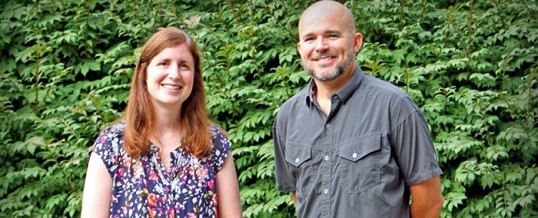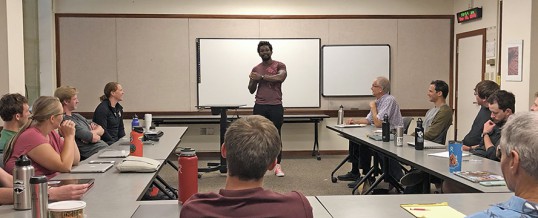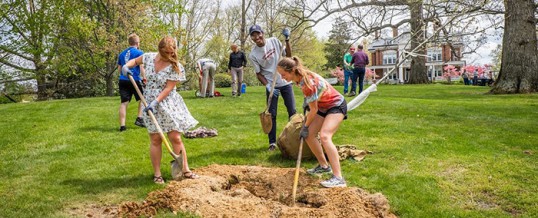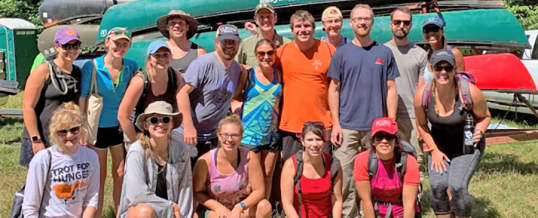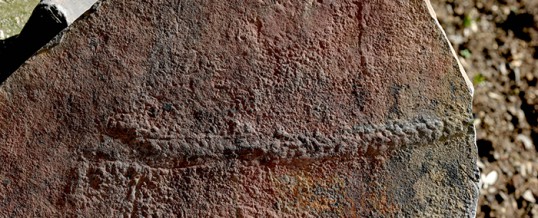[vc_row][vc_column][vc_column_text]From VT News | September 27, 2019
We all experience bias at some point in our lives: It can be unconscious or conscious, innate or learned, and scientific journals want to know if and why this is happening in their peer review process.
Functional Ecology, which is a highly respected journal in the field of ecology, is taking the lead by conducting a first-of-its-kind comprehensive study that will hopefully put an end to the mystery that surrounds the cause of bias in scientific publishing communities.
Virginia Tech professors Dana Hawley and Bill Hopkins are associate editors for the journal and they will be managing some of the paper submissions for the study, which launched on Sept. 5.
“As scientists, we like to think that we are always objective. That’s the foundation of science. But scientists are human beings too. No one is ever completely objective when it comes to something like evaluating someone else’s work. Because peer review is the key checkpoint determining whether scientific results are published or not, the idea of making this review as objective as possible is really important,” said Hawley, a professor in the Department of Biological Sciences in the College of Science.
Although there are different kinds of bias that will be addressed in this study, Functional Ecology noticed that one bias, in particular, receives more attention in previous studies of peer review bias than others: gender bias.
In fact, gender bias receives the most attention because the results of these studies have been surprisingly inconclusive. Where some studies have shown that female authors receive lower acceptances into journals, others have shown that female authors receive higher peer review scores compared to males.
“I will say that, coming into this Functional Ecology initiative, I assumed that the effectiveness of double-blind peer review for addressing issues of gender bias was more supported by data. And what I am learning is that it’s not clear,” said Hopkins, director of the Global Change Center at Virginia Tech and professor in the Department of Fish and Wildlife Conservation in the College of Natural Resources and Environment.
This study will examine bias related to gender, institutional prestige, author reputation, and race on a large, randomized scale over multiple years.
“I have definitely had times where I, as an author and mentor, have worried for my female graduate students, that certain reviewers may have been influenced by their names – and you just have to wonder,” said Hawley, an affiliated faculty member of the Global Change Center at Virginia Tech.
“It is really upsetting as a mentor, because you want all of your students to be viewed equally as a scientist and nothing else. Of course, we are all human. We just don’t know what things influence the tone of the reviewer or the ranking that they gave that paper.”
In terms of female authors, there is a pattern that suggests that there is a relatively low percentage of women that publish in highly regarded journals, such as Science. This could be due to the fact that women are generally less represented at higher ranks in academia, but it could also partly be a result of the peer review process.
Typically, manuscripts that are published in a peer review journal are single-blind, which means that the author does not know, or is “blinded” from, the identity of the reviewer. However, this study will be a double-blind trial, where neither the person reviewing the paper knows the identity of the authors nor do the authors know the identity of the reviewer.
Though this study is limited to the field of ecology, a field which has relatively equal gender representation compared to other fields, it can have implications for other scientific journals and the scientific community as a whole. But for Hopkins, he said that it all depends on the results of the study.
“If you look at the studies that have been done so far, none of them are as comprehensive as the multi-year study that Functional Ecology is conducting. There is some evidence that double blind is an improvement over single blind review, and there’s some evidence that it’s not an improvement. Taken together, the conflicting results of past studies clearly suggest that we need a large-scale randomized trial and that is exactly what Functional Ecology is doing.”
“I think it’s really an important study just because it sends a message that the whole culture of science is really starting to take bias seriously,” said Hawley.
~ Written by Kendall Daniels
[/vc_column_text][/vc_column][/vc_row]
